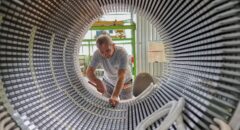Hitachi ABB and NTU Singapore to collaborate on Solid State Transformer tech

Hitachi ABB Power Grids and Nanyang Technological University, Singapore (NTU Singapore), a leading research-intensive university, have agreed to work together to advance developments in Solid State Transformer (SST) technology.
The project is led by the Energy Research Institute @ NTU (ERI@N), and is supported by the National Research Foundation, Singapore (NRF).
The project is part of the Singapore Government’s flagship Energy Grid 2.0 initiative aimed at shaping the next-generation grid system and transforming how energy is managed by consolidating multiple energy sources into a single intelligent network that is more efficient, sustainable and resilient.
“As a global technology leader, we are delighted to partner with NTU in this cross-stakeholder collaboration project, bringing together government, academia and industry in an effort to accelerate energy transition and enhance quality of life,” said Gerhard Salge, Chief Technology Officer, Hitachi ABB Power Grids.
Solid state transformers (SST) incorporate power semiconductor components, control circuits and high-frequency transformers, offering bi-directional power flow control, harmonics reduction, and many other benefits. They allow conversion from Alternate Current (AC) to Direct Current (DC), DC to AC and also DC to DC on different voltage levels. They are designed to support power system transformation towards more flexible AC and DC mixed system configurations, facilitating the integration of renewable energy sources close to DC loads.
This new grid architecture can also benefit applications such as data centers, wind farms, solar plants, hydrogen generation and electric vehicle charging infrastructure. The partnership can also contribute to land scarcity challenges faced by Singapore. As a small island nation, the country has always sought innovative solutions to stretch its land options, while balancing commercial needs and sustainability.
NTU’s Senior Vice President (Research) Professor Lam Khin Yong, said, “The Solid State Transformers (SST) are multifunctional and will allow users flexible control on the amount of power that is distributed to networks.” Lam continued, “By doing away with multiple separate equipment required by current conventional transformers, we also save on land-use, making the SST an attractive solution for a more efficient electricity grid.”
“One of the key objectives in partnering with Hitachi ABB Power Grids for this project is to take the technology to the next level – from lab to real world applications. Both organizations have considerable knowledge and experience in the development of SST technology and we are confident that this partnership will catalyse commercial deployment to support a sustainable energy future,” Professor Lam added.
Beyond the SST project, Hitachi ABB Power Grids and NTU have also been cooperating in several areas of advancement in grid technologies, including energy storage systems and e-mobility.
“Singapore is at the forefront when it comes to the sustainable development of smarter cities and the power grid is an integral contributor,” said Nirupa Chander, Managing Director, Hitachi ABB Power Grids, Singapore. “We are proud to work with NTU and NRF on this project of national and international relevance,” Nirupa added.
Dr Yeoh Lean Weng, Senior Director for Urban Solutions and Sustainability at NRF, said, “The partnership between NTU and Hitachi ABB Power Grids is one of many examples that demonstrates the international recognition our local institutions receive for scientific excellence.” He continued, “Singapore is committed to supporting cutting edge research that not only meets our national needs, but through wider partnerships, advance the benefits beyond our shores.”
Source: Hitachi ABB
Photo (for illustrative purposes): Core Zone Singapore / Sasin Tipchai / Pixabay / Free for commercial use








